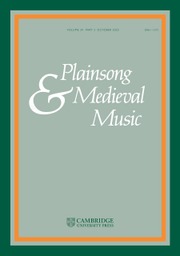No CrossRef data available.
Article contents
The music is the message II: Adémar de Chabannes' music for the apostolic Office of Saint Martial
Published online by Cambridge University Press: 10 April 2006
Abstract
When in 1028–9 Adémar de Chabannes created his apostolic liturgy for Saint Martial, patron saint of the abbey that bears his name in Limoges, he preserved most items in the Divine Office from the existing liturgy for the saint that venerated him as a confessor-bishop. For the last two responsories of the third nocturn of Matins, however, Adémar provided new compositions that depart from the prevailing style of this genre: the penultimate responsory, Gloriosus est, is entirely newly composed, while the final responsory, O sancte dei apostole, consists of a new introduction that is prefixed to the existing final responsory of Matins, O Marcialis princeps. The newly composed material contains music that is much more dramatic in conception in comparison with the typical undulating style of the genre, and with this music, Adémar makes a strong statement about Martial's new status as an apostle.
- Type
- Research Article
- Information
- Copyright
- 2006 Cambridge University Press


